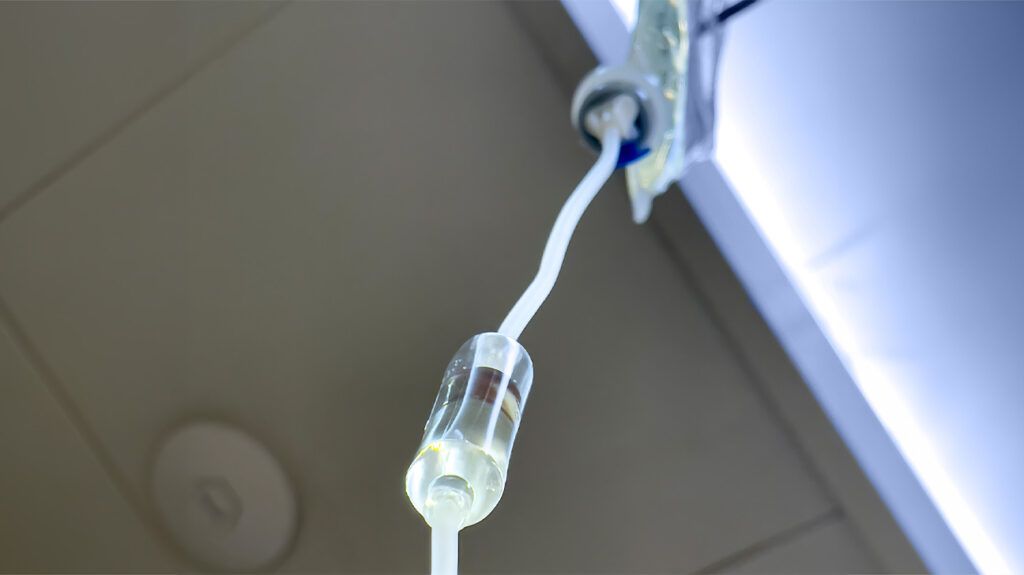Infusion therapy for psoriatic arthritis (PsA) involves administering medications known as biologics directly into a person’s vein. They may reduce symptoms and slow down the progression of the condition.
PsA is a lifelong condition in which the immune system attacks the joints and where the tendons and ligaments meet bone. This leads to painful swelling, stiffness, pain, and fatigue, among other symptoms.
Treatments can include oral medications, physical therapies, and lifestyle modification. A doctor may also recommend intravenous (IV) biologics for moderate-to-severe PsA.
Read on to learn more about infusion therapy for PsA. This article explains how infusions for PsA work and what to expect.

Infusions for PsA use drugs known as biologics to block parts of the immune system.
The biologics that doctors prescribe for PsA work in several ways, depending on the medication. Some block cells known as T-cells, which are a type of white blood cell that targets infection.
Others block specific proteins that may be overactive in people with PsA, such as:
- tumor necrosis factor-alpha (TNF-alpha)
- interleukin 12/23 blocker
- interleukin 17-A
These cells and proteins usually defend the body from external threats. However, they may also contribute to PsA development.
Some biologics can slow PsA progression and prevent further joint damage. Many are injectable, but the Food and Drug Administration (FDA) has approved several options for IV infusion.
Learn more about biologics for PsA.
The FDA has approved the following medications for IV infusion in people with moderate-to-severe PsA.
Infliximab (Remicade)
Infliximab (Remicade) is a monoclonal antibody. It has had approval since 2005 for PsA treatment.
After receiving the initial dose, a person will receive doses 2 weeks and 6 weeks after. Doses then occur every 8 weeks.
Golimumab (Simponi Aria)
Golimumab (Simponi Aria) is a TNF-alpha inhibitor that has had FDA approval for adults with PsA since 2017 and children older than 2 years since 2020.
Golimumab infusions take 30 minutes. The second dose follows 4 weeks after, and then every 8 weeks after this.
Abatacept (Orencia)
Abatacept (Orencia) is a T-cell inhibitor that people can either inject under the skin at home or receive as an infusion in a doctor’s office.
The FDA approved this for people with PsA in 2017.
Infusion therapy for PsA may help with managing symptoms. It can also help slow down the progression of the condition.
A
Personal preference is the main factor to consider when comparing infusions to injections. A
- not wanting to administer injections themselves
- needing fewer doses, less often
- preferring that a healthcare professional gives the medication
- feeling safer receiving infusion in a hospital
- finding it easier to remember doses as they have an appointment
A person can contact their doctor if they wish to discuss IV therapy for PsA.
People receive infused biologics through a vein in the hospital, doctor’s office, or infusion center. A healthcare professional attaches an IV drip to an individual’s hand or arm, and the medication slowly moves into the body through a vein.
The insertion of the IV needle into the hand or arm may lead to a slight pinch, but the infusion itself should be pain-free. Drinking a lot of water within around 24 hours before the infusion may help the healthcare professional find a good vein for the procedure.
The procedure for golimumab takes around 30 minutes. Infliximab takes roughly 2 hours, while abatacept infusions take about 1 to 2 hours.
After an infusion, people may need to wait in the hospital for another 2 hours in case of side effects or reactions.
Doctors may recommend infusions for moderate-to-severe PsA.
Guidelines from 2018 — by the American College of Rheumatology and National Psoriasis Foundation — suggest TNF-alpha inhibitors as a first-line treatment for PsA.
IV infusions of biologics work relatively quickly to reduce swelling and other PsA symptoms.
The Psoriasis and Psoriatic Arthritis Alliance suggests that most people who receive either infusions or injections of PsA medications see improved symptoms within 4 to 6 weeks.
However, some people may not notice improvements until 12 weeks into treatment.
As with any medication, biologics carry a risk of side effects.
An infusion reaction is possible — an allergic response to the medications. This can cause hives, itching, and flushing. Headaches may also occur due to fluid imbalance.
Severe allergic reactions can cause the following:
- shortness of breath
- nausea
- digestive symptoms
- abdominal pain
- chest pain
The medical professional administering the infusion can help monitor for any side effects. Medications such as diphenhydramine (Benadryl) can provide symptom relief during an infusion reaction.
Learn more about psoriatic arthritis
Intravenous (IV) infusions of biologic drugs may help slow the progression of psoriatic arthritis (PsA) and relieve symptoms by blocking parts of the immune system, such as tumor necrosis factors and T-cells.
Examples of biologics for the treatment of PsA include golimumab, infliximab, and abatacept.
Infusions involve connecting the vein in a person’s hand or arm to a drip. The procedure lasts between 30 minutes and 2 hours, depending on the medication and individual dosage.
Biologics increase a person’s infection risk, and infusions may trigger an infusion reaction. A person can discuss the possible benefits and risks of PsA infusions with a doctor so they can make an informed decision about their treatment plan.
